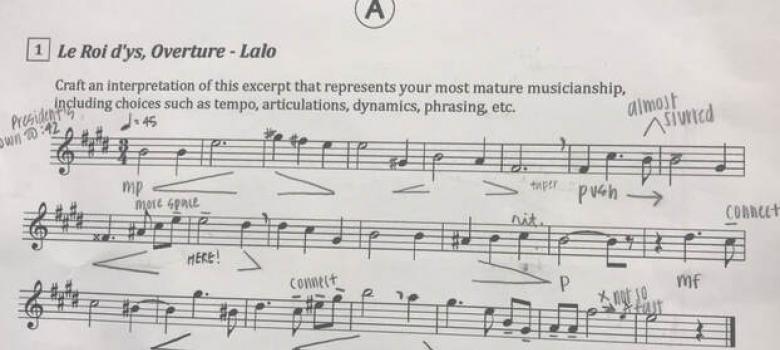You are here
Audition Tips
The following are tips that will help you be successful in your audition for entry into the ISU ensembles, or any audition you ever take in your playing career.
- The greatest source of anxiety during an audition is failure to adequately prepare the audition materials. If you are well-prepared, you will be less nervous! Preparation includes knowing correct tempos, styles, articulations, etc., in addition to knowing the correct notes and rhythms.
- You are living in the Age of Information! Don't know what a musical term means? There's Google. Don't know how one of the excerpts goes? There's YouTube. Don't know if you're in tune or if you've got the correct tempo? There's an app (several, actually) for that. Don't know your scales? There are tons of web resources to help you learn them. Use these resources to ensure that you are fully prepared for your audition and give yourself the best chance for a positive experience.
- Dress professionally for the audition. How you look has an impact on how people listening to you perceive you. Dress sloppy, and listeners are more apt to hear your mistakes. It will also make YOU feel more professional, and if you feel professional, you are more likely to have a good audition. You don't have to wear a suit or a fancy dress...but flip flops and a ragged t-shirt are probably a bad idea.
- Don't "aim" your instrument at the judges, especially if you are a directional instrument like the trumpet or trombone. Aim slightly to the side of the listeners.
- Don't start a passage over, and certainly do not ask "Can I start over?" If you make a mistake, recover from it, and keep going. Often, audition judges are listening for your ability to recover from mistakes, as much as anything else.
- Perform the correct tempos! Use a metronome religiously in your preparations to help you with this, and don't slow down just because a passage is tricky, or speed up because a passage is easy. Maintain a steady tempo throughout unless the music calls for something different.
- Work on your scales. ALL of them, including the chromatic scale. While most auditions (including ours) will not ask for minor scales, it is wise to know them as well. Know all your major scales (and the chromatic scale) by heart.
- Think about style and interpretation...don't just come in and play a vanilla rendition of the excerpts, devoid of dynamics, articulations, or feeling. Let your musicianship shine through. If you are asked to prepare your own interpretation of an excerpt, then prepare SOME kind of interpretation. ANYTHING. It can be as simple and tasteful as this:
 |
- In general, you should always execute rests at their given duration, without altering the tempo. However, if there is a section of the music with a long rest, you may ask how the judges wish for you to proceed before starting the music.
- Pay special attention to note durations...especially sustained notes. If you have a dotted half note at the end of a phrase, the judges expect to hear 3 beats, not 2, not 2.5, not 3.25, etc.
- Relax. It isn't life or death. You will take several auditions throughout the course of your collegiate career, and each one is an opportunity to learn what you can do better. We expect that many, if not most of you, will be nervous/anxious...and this is ok.
